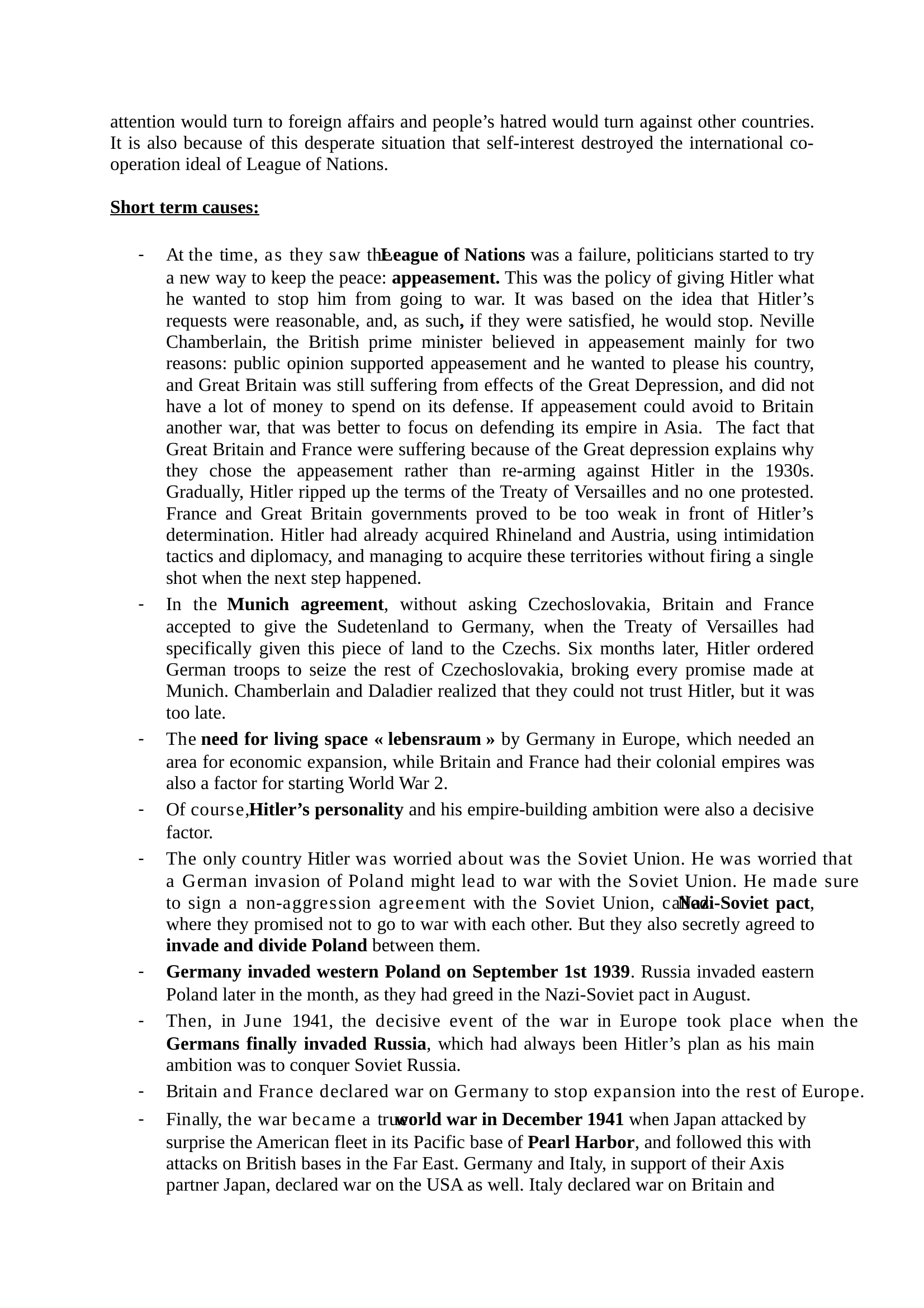THE CAUSES OF WORLD WAR 2
Publié le 23/02/2015
Extrait du document
«
attention would turn to foreign affairs and people’s hatred would turn against other countries.
It is also because of this desperate situation that self-interest destroyed the international co-
operation ideal of League of Nations.
Short term causes:
At th e tim e, a s th ey s aw th e League of Nations was a failure, politicians started to try
a new way to keep the peace: appeasement.
This was the policy of giving Hitler what
he wanted to stop him from going to war.
It was based on the idea that Hitler’s
requests were reasonable, and, as such , if they were satisfied, he would stop.
Neville
Chamberlain, the British prime minister believed in appeasement mainly for two
reasons: public opinion supported appeasement and he wanted to please his country,
and Great Britain was still suffering from effects of the Great Depression, and did not
have a lot of money to spend on its defense.
If appeasement could avoid to Britain
another war, that was better to focus on defending its empire in Asia.
The fact that
Great Britain and France were suffering because of the Great depression explains why
they chose the appeasement rather than re-arming against Hitler in the 1930s.
Gradually, Hitler ripped up the terms of the Treaty of Versailles and no one protested.
France and Great Britain governments proved to be too weak in front of Hitler’s
determination.
Hitler had already acquired Rhineland and Austria, using intimidation
tactics and diplomacy, and managing to acquire these territories without firing a single
shot when the next step happened.
In th e Munich agreement , without asking Czechoslovakia, Britain and France
accepted to give the Sudetenland to Germany, when the Treaty of Versailles had
specifically given this piece of land to the Czechs.
Six months later, Hitler ordered
German troops to seize the rest of Czechoslovakia, broking every promise made at
Munich.
Chamberlain and Daladier realized that they could not trust Hitler, but it was
too late.
Th e need for living space « lebensraum » by Germany in Europe, which needed an
area for economic expansion, while Britain and France had their colonial empires was
also a factor for starting World War 2.
Of cour s e, Hitler’s personality and his empire-building ambition were also a decisive
factor.
Th e only country Hitler wa s worried a b out wa s th e S oviet Union.
He wa s worried th at
a G erm a n inva sion of P oland might le ad to war with th e S oviet Union.
He m a d e s ur e
to sign a non-a g gr e s sion a gr e e m e nt with th e S oviet Union, c alled Nazi-Soviet pact ,
where they promised not to go to war with each other.
But they also secretly agreed to
invade and divide Poland between them.
Germany invaded western Poland on September 1st 1939 .
Russia invaded eastern
Poland later in the month, as they had greed in the Nazi-Soviet pact in August.
Th en, in J u n e 1941, th e d e cisive ev ent of th e war in Europ e took plac e wh en th e
Germans finally invaded Russia , which had always been Hitler’s plan as his main
ambition was to conquer Soviet Russia.
Britain a n d Franc e d e cl ar ed war on G erm any to stop exp a n sion into th e re st of Europ e.
Fin ally, th e war b e c a m e a tru e world war in December 1941 when Japan attacked by
surprise the American fleet in its Pacific base of Pearl Harbor , and followed this with
attacks on British bases in the Far East.
Germany and Italy, in support of their Axis
partner Japan, declared war on the USA as well.
Italy declared war on Britain and.
»
↓↓↓ APERÇU DU DOCUMENT ↓↓↓
Liens utiles
- The Sound of Music The Sound of Music, motion picture about a religious young governess who brings music and happiness to a widower's large family, set in Austria during World War II (1939-1945).
- Holocaust I INTRODUCTION Holocaust, the almost complete destruction of Jews in Europe by Nazi Germany and its collaborators during World War II (1939-1945).
- The New World Order and the first Iraq war
- TUEUR DE DAIMS (Le) [The Deerslayer, or The First War-Path]. (Résumé et analyse)
- Reasons of the first wolrd war

































